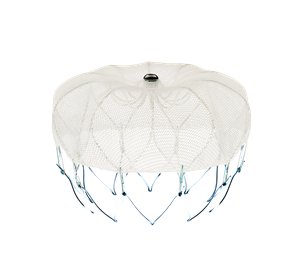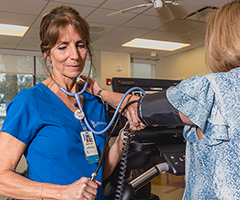Atrial Fibrillation (AFib)
Lee Health: Your Trusted Heart Specialists For Treating Your Atrial Fibrillation
Lee Health Cardiology specialists are here to help you understand and treat your atrial fibrillation. AFib affects more than 5 million adults in the US and is the most common type of irregular heartbeat. So having a healthy heart partner in Lee Health is a great first step to treating this condition.
What is atrial fibrillation or AFib?
Atrial fibrillation (AFib), otherwise known as an irregular heartbeat, is the most common heart arrhythmia. Arrhythmia is when your heart beats too fast, too slow, or in an irregular way.
Normally your heart contracts and relaxes in a regular beat but during AFib, the electrical impulses of the heart don’t begin in the normal area, called the atria. Instead, the electrical impulse starts from many different areas and spreads out in a chaotic manner. This causes a disorganized, irregular – and uncomfortable – heartbeat.
-
Cardiac Critical Care
At the first sign of a heart attack, every second counts. Our emergency cardiac care team is available 24 hours a day at our four adult hospitals.
Symptoms of Atrial Fibrillation (AFib)
Symptoms of atrial fibrillation present differently in different people. Some people have little or no symptoms, while others are aware the exact moment they go into AFib. Many patients report feeling heart pounding, dizziness, shortness of breath, and chest discomfort. Other common symptoms are the inability to exercise and fatigue.
AFib can be stressful because it’s unpredictable. Patients may be afraid to travel and attend social events for fear of having AFib.
-
Cardiology - Heart Institute at Bass Road
-
Cardiology - Heart Institute at Sanctuary
-
Cardiology - Heart Institute at Cape Coral Hospital
-
Cardiology - Heart Institute at Coconut Point
-
Cardiology - Heart Institute at Medical Plaza One
-
Cardiology - Heart Institute at Metro Parkway
Causes of Atrial Fibrillation (AFib)
The most common cause of atrial fibrillation stems from the heart's structure, but other possible causes include:
- Coronary artery disease
- Heart attack
- Congenital Heart Defect (Heart defect that you're born with)
- Heart valve problems
- High blood pressure
- Lung diseases
- Physical stress due to surgery, pneumonia or other illnesses
- Previous heart surgery
- Sick sinus syndrome
- Sleep apnea
- Thyroid disease and other metabolic imbalances
- Use of stimulants such as caffeine, tobacco and alcohol and even certain medications
- Viral infections
It is important to note that people with no known heart problems or heart damage are still at risk for atrial fibrillation.
Atrial Fibrillation (Afib) Treatment
Ablation therapy is the only treatment that offers a potential cure for arrhythmia, but there are two additional approaches for managing AFib:
- Rate controlling strategy. Several different medications help control the heart rate. This is important because fast, uncontrolled heart rates can weaken the heart muscle and cause heart failure.
- Rhythm controlling strategy. Experts use chemical or electrical cardioversion – and possibly antiarrhythmic drug therapy – to keep your heart in a normal beating pattern. It’s important to remember that medication can control AFib, but it won’t necessarily cure it.
Additionally, anticoagulation, or preventing blood clots from forming in the left atrium, is important to prevent strokes regardless of your treatment. Patients usually take either aspirin or warfarin, depending on the risk factors.
What is Lee Health's approach to Afib treatment?
We offer the most advanced and effective arrhythmia treatments to our patients. We perform more treatments for atrial fibrillation than any other hospital system in Southwest Florida. In many cases, the treatments we provide are not available anywhere else in the region.
At Lee Health, we have two fully equipped labs for ablation and device implants. These labs are staffed by nurses and technicians who work exclusively on heart rhythm disorders.
Who should I contact?
If you have symptoms of atrial fibrillation or believe you may have a heart rhythm disorder, call us at 239-343-6350
Non Surgical Solutions for AFib
-
Getting the WATCHMAN™
At Lee Health, we know every patient is different, but your Watchman™ implant should allow you to live a full, active life. Your expert Lee Health physician will take the time to answer your questions and find the best treatment option available.
-
Non Surgical Solutions - The WATCHMAN™ Implant
Supporting non-surgical treatments and alternative procedures to restore health inside and out. The Watchman Procedure helps break the connection between atrial fibrillation and stroke. Visit HealthPark Medical Center in Fort Myers Florida for The Watchman Implant.
Related To Atrial Fibrillation (AFib)
Surgical Solutions for Atrial Fibrillation
-
Cardiothoracic Surgery
Surgical care for conditions affecting the inside of the chest. Lee Health's hub for cardiothoracic care in SWFL.
























































































